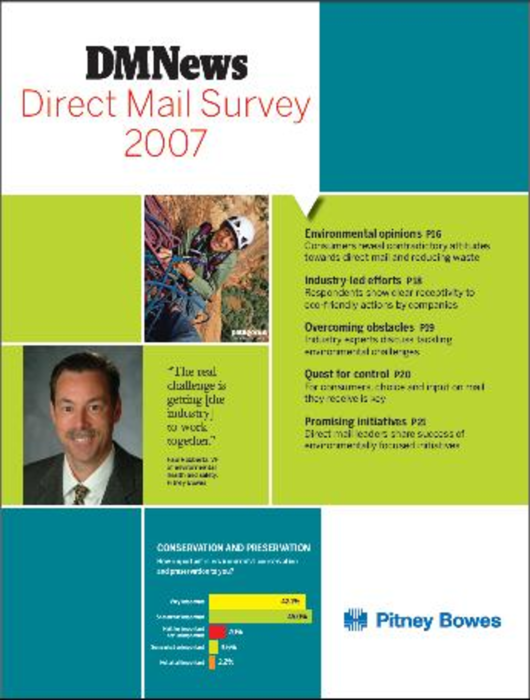The first DMNews/Pitney Bowes survey on direct mail and the environment suggests that consumers greatly overestimate the environmental impact of direct mail, a fact that likely colors attitudes toward the medium. Nonetheless, the survey shows that people enjoy their mail and do not want to stop receiving it — even if doing so were to benefit the environment — and that they are open to industry efforts to police itself.
The survey addresses consumer misinformation and the need to step up industry efforts to improve consumer opinions on environmental issues. Results and insights from direct mail experts appear in a special article in DMNews‘ December 17 issue.
Of the 1,000 Americans age 18 and over who took part in the survey (divided equally between men and women), 48% guessed that advertising mail from US households counted for more than half of the country’s municipal waste. Another 36% said it counted for slightly more than a third of that waste, and 12% of respondents guessed 9%.
In reality, advertising mail is responsible for just 2% of all municipal waste in the
Respondents also vastly overestimated the amount of carbon dioxide released in the delivery of advertising mail. When asked to rank seven activities by their carbon dioxide output, respondents chose “Delivering an average of 10 to 11 pieces of transactional mail to your house for a year” as the third-most damaging activity, behind “driving a 2007 automatic, compact, four-door sedan 1,000 miles in one month” and “one year’s electricity usage for a 1992 top-freezer refrigerator with 19 to 21 cubic feet of space.”
In truth, not only does delivering that quantity of mail produce the least carbon dioxide of all seven activities listed, it produced hardly a fraction of those believed by respondents to be the least harmful.
The good news is that respondents showed a high level of receptivity to industry-led efforts to reduce direct mail’s impact on the environment. Sixty-eight percent of respondents said they would have a higher opinion of direct mailers if they used recycled paper and cardboard products – a practice that’s become all but standard among industry leaders such as Williams-Sonoma and Dell. Sixty-seven percent said they would think more highly of the industry if it planted trees to offset paper production, another increasingly popular tactic.
Respondents also said their opinion of the industry would improve if it went ahead with ideas that could be implemented in the not-too-distant future. For example, 53% said their opinion of unsolicited mail would be more positive if they knew there was an agency seal of approval or “green mail” label awarded by the industry itself.








